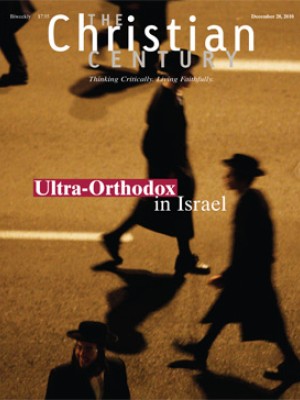Surveys support openly gay in the military
The long-awaited Pentagon survey of military personnel found that the majority sees little negative impact if and when gays are allowed to serve openly in the U.S. armed forces.
The possible repeal of a 17-year policy of "don't ask/don't tell" was uncertain because of strong Republican resistance in Congress to a change; also, a federal court order to repeal the ban immediately is currently under appeal in the U.S. Ninth Circuit Court of Appeals.
At least the survey figures are in: the Pentagon canvass of 400,000 members of the military found 46.1 percent said that troop readiness would not be affected, and an additional 6.8 percent said the repeal would be a positive step. Another 25 percent predicted mixed results.
Read our latest issue or browse back issues.
Upon releasing the study November 30 in Washington, Defense Secretary Robert M. Gates and Admiral Michael Mullen, chairman of the Joint Chiefs of Staff, spoke in favor of lifting the policy, although Gates said the military would need time to educate its personnel, especially combat units.
The study noted that at least 40 percent of combat troops raised concerns, with 43 percent of marine combat troops —the smallest and most conservative of the services—saying they foresaw negative effects.
Most of the worries expressed by troops were exaggerated or were based on negative stereotypes of homosexuals, the study found. Most of those who had direct associations with a service member believed to be gay or lesbian reported few difficulties, according to the coauthors of the study, Pentagon general counsel Jeh Johnson and army general Carter Ham.
However, if the policy is repealed, the study said, special attention should be paid to the 3,000-member chaplain corps, which has "some of the most intense and sharpest divergence of views" on the issue.
According to the report, some chaplains said "we are all sinners" and chaplains should care for everyone, while other chaplains condemned homosexual behavior as a sin, leading them to withhold support for open homosexuals. The Pentagon study averred that chaplains' First Amendment rights would be protected if the ban is repealed.
"Service members will not be required to change their personal views and religious beliefs," the report said. "They must, however, continue to respect and coexist with others who may hold different views and beliefs."
The report said that only three of about 145 chaplains who took part in focus groups said they would ask to leave the military if the "don't ask/don't tell" policy is dropped.
Chaplains who serve a branch of the military are required to be sponsored by endorsing churches, denominations or religious bodies. Out of 200 endorsing agencies, none of the 77 that responded to the Pentagon said they would withdraw endorsements if a repeal is enacted.
One official who urges that chaplains not contemplate quitting military service is Paul Vicalvi, a retired army chaplain who directs the Chaplains Commission for the National Association of Evangelicals.
He told Religion News Service that he has long advised chaplains that they are to serve people whether they find the circumstances positive or negative.
"I'm telling them not to retire. . . . Now some of them may say, 'I just can't operate in this environment,' but that's not coming from me," said Vicalvi.
A Pew poll, released separately a day before the Pentagon announcement, said almost every religious group in the United States supports ending the ban. White mainline Protestants (62 percent), black Protestants (52 percent) and Catholics (66 percent) all favor allowing gays and lesbians to serve openly.
Only white evangelicals (48 percent) came close to a majority in opposing open gays and lesbians in the military. While 40 percent of weekly churchgoers favor maintaining the ban, an equal percentage favors lifting it.
In Pew interviews November 4–7 of 1,255 adults, 58 percent favored allowing gays and lesbians to serve openly in the military and 27 percent opposed, with 15 percent uncertain.
—RNS contributed to this story.





